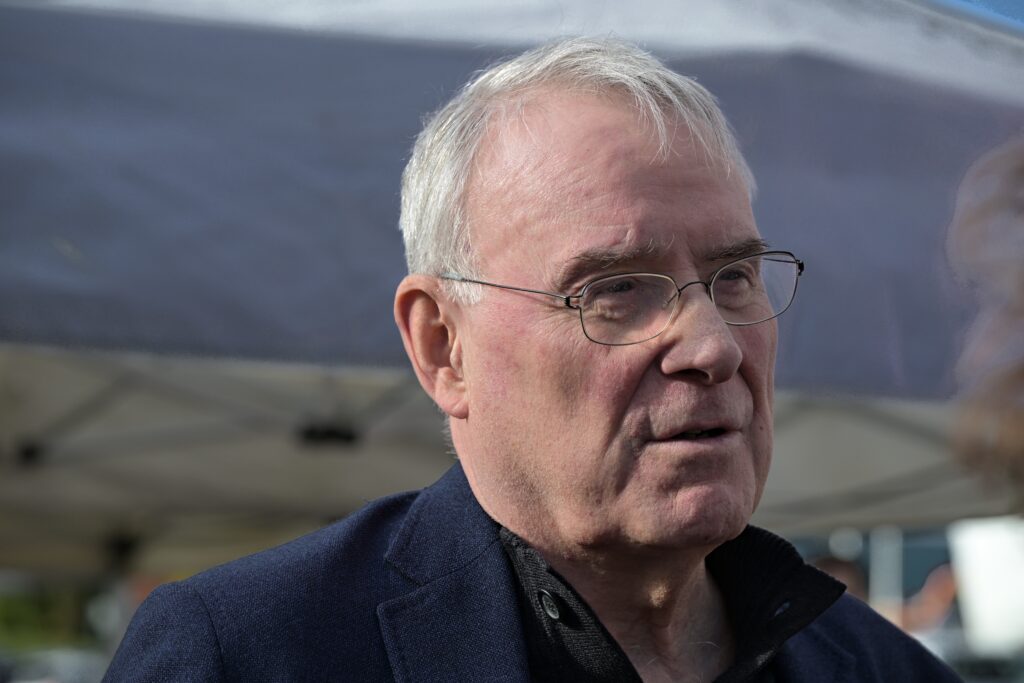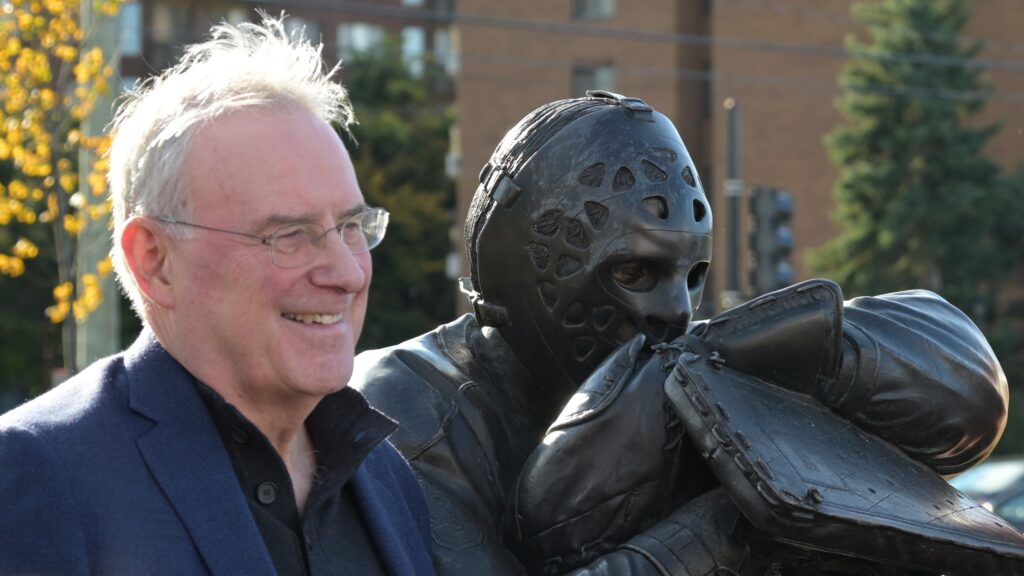
Ken Dryden, a towering figure whose influence stretched far beyond the confines of a hockey rink, passed away on Friday at the age of 78 following a battle with cancer. His death marks the end of a truly remarkable life, one characterized by unparalleled success in virtually every endeavor he undertook. From his formidable presence in the net for the Montreal Canadiens to his significant contributions as an author, lawyer, executive, and politician, Dryden consistently demonstrated a rare blend of athletic prowess and profound intellectual curiosity that redefined the modern athlete.
His passing prompted an outpouring of tributes from across the hockey world and beyond, with NHL Commissioner Gary Bettman stating, “From the moment Ken Dryden joined the Montreal Canadiens as a 23-year-old rookie in 1971, he made an immediate and lasting impact on the NHL, the Canadiens franchise and the goaltending position.” Canadiens owner Geoff Molson echoed these sentiments, highlighting Dryden’s broader societal impact: “Behind the mask he was larger than life. We mourn today not only the loss of the cornerstone of one of hockey’s greatest dynasties, but also a family man, a thoughtful citizen, and a gentleman who deeply impacted our lives and communities across generations.”
Indeed, Dryden’s career was a testament to his relentless pursuit of excellence, whether physical, intellectual, or civic. He was not merely a goaltender but a multifaceted individual whose journey saw him achieve the highest echelons in sports, literature, and public service. This in-depth article will delve into the extraordinary life of Ken Dryden, exploring the pivotal moments and achievements that cemented his legacy as one of Canada’s most revered figures.

1. **Early Life and NHL Draft Journey: An Unconventional Beginning**
Ken Dryden’s journey into professional hockey began with an unconventional twist, characteristic of the unique path he would forge. Born on August 8, 1947, in Hamilton, Ontario, Dryden was first selected by the Boston Bruins in the third round, 14th overall, of the 1964 NHL Draft. This initial step hinted at a promising career, yet it was merely the first turn in a path defined by unexpected choices.
Just over two weeks after the Bruins drafted the then 16-year-old Dryden, on June 28, his rights were unexpectedly traded. In a pivotal move that would irrevocably alter NHL history, the Boston Bruins sent Dryden’s rights to their storied rivals, the Montreal Canadiens. This transaction set the stage for Dryden’s legendary tenure with the Montreal franchise, though his immediate trajectory would lead him down a path rarely trodden by aspiring hockey stars.
Rather than immediately joining the professional ranks, Dryden, known for his deep intellectual curiosity, made a bold decision. He opted to put professional hockey on hold to pursue a college degree at Cornell University. This choice was highly unusual for its time, distinguishing him from most contemporaries and foreshadowing a life where academic and professional pursuits outside of sports would hold equal importance, underscoring his commitment to education and personal growth.
2. **Academic Pursuit and Collegiate Hockey Dominance at Cornell University**
Dryden’s time at Cornell University (1966-1969) proved to be a period of exceptional growth, both intellectually and athletically. His decision to attend university, while foregoing an immediate professional career, allowed him to pursue a bachelor’s degree in history, a testament to his profound intellectual curiosity that would influence his later career as an author and public servant.
On the ice, Dryden was nothing short of dominant for the Cornell Big Red. Over three seasons, he compiled an astonishing 76-4-1 record, a .944 win percentage that remains a Big Red goaltending record. He famously led Cornell to the 1967 NCAA Championship, a significant national achievement that showcased his elite talent and leadership capabilities. His collegiate goals-against average of 1.59 ranks second in Big Red history.
He was a three-time All-American, becoming the first Cornell player to eventually play in the NHL. This collegiate dominance, acknowledged by NHL Commissioner Gary Bettman as “among the greatest runs in collegiate hockey,” firmly established Dryden’s reputation as a top-tier goaltender before he even formally entered the professional spotlight, shaping his unique identity.
3. **A Staggering NHL Debut: Stanley Cup and Conn Smythe Trophy as a Rookie**
After his acclaimed collegiate career and a brief, successful stint with the Montreal Voyageurs in 1970-71, Ken Dryden finally joined the Montreal Canadiens. His NHL debut on March 14, 1971, was merely the overture to one of the most improbable and spectacular rookie seasons in professional sports history. Despite playing only six regular-season games, Dryden’s immediate impact was profound, leading him to be named Montreal’s starting goaltender for the challenging Stanley Cup Playoffs.
What followed was an extraordinary display of skill, composure, and leadership from the 23-year-old rookie. He backstopped the Canadiens through a formidable postseason run, commencing with a stunning upset of the League-leading Boston Bruins in the NHL Quarterfinals, a clear demonstration of his ability to perform under intense pressure. The Canadiens continued their improbable march, overcoming the Minnesota North Stars, leading to the Stanley Cup Final.
In a thrilling, decisive seven-game series against the Chicago Blackhawks, Dryden led the Canadiens to a 4-3 victory, securing the Stanley Cup. His exceptional performance earned him the Conn Smythe Trophy as the playoffs’ most valuable player. This achievement was particularly astounding given his limited regular-season experience, making him the first and only player in NHL history to win the Conn Smythe Trophy before winning the Calder Trophy as the league’s best rookie. NHL Commissioner Gary Bettman noted, “It is almost incomprehensible to believe that he accomplished all of that the year prior to winning the Calder Memorial Trophy as the League’s best rookie in 1971-72.”
4. **Solidifying Rookie Status: Calder Memorial Trophy Winner**
The subsequent 1971-72 season saw Ken Dryden not only confirm his extraordinary talent but also claim the official recognition befitting his status as the League’s top first-year player. Having already defied expectations by lifting the Stanley Cup and earning the Conn Smythe Trophy, Dryden’s performance in his first full NHL season cemented his reputation as a dominant force in goal. This year, he was formally recognized with the Calder Memorial Trophy, awarded to the NHL’s outstanding rookie.
During the 1971-72 season, Dryden led the NHL with an impressive 39 wins, showcasing his ability to consistently deliver victories for the Canadiens over a demanding schedule. His statistical achievements extended beyond raw wins, as he ranked among the League’s elite in several key goaltending categories. He finished fourth in the League in Goals Against Average (GAA) with 2.24, third in save percentage at .930, and second in shutouts with eight.
These comprehensive statistics, combined with his undeniable impact on the Canadiens’ overall performance, underscored that his playoff heroics were far from a fluke. Dryden was a legitimate star, consistently performing at an elite level. His Calder Trophy win, following his earlier Stanley Cup and Conn Smythe victories, marked a unique sequence of accomplishments for a player in the early stages of his NHL career, establishing a new benchmark for rookie success in professional hockey.
5. **A Brief Hiatus: Pursuing a Law Degree Amidst Contract Dispute**
Even in the midst of his rapidly ascending NHL career, Ken Dryden’s commitment to his intellectual pursuits remained a defining characteristic, setting him apart from his peers. Following his second Stanley Cup victory with the Canadiens in 1973 and a Vezina Trophy win, Dryden made another unconventional and impactful decision that highlighted his independent spirit and determination. Unhappy with the contract offer, he announced his retirement from hockey at the remarkably young age of 26.
This bold decision led him to sit out the entire 1973-74 NHL season, a move that stunned the hockey world given his dominant performance and the Canadiens’ recent successes. Instead of returning to the ice, Dryden dedicated this period to furthering his education and professional development. He went to work at a Toronto law firm and diligently fulfilled the requirements for his law degree at McGill University, which he had previously been pursuing alongside his playing career.
His hiatus was a powerful statement about the multifaceted life he envisioned for himself. It was a clear indication that Dryden was not merely a hockey player but a thoughtful, principled individual who prioritized his broader ambitions and intellectual growth. Hall of Fame teammate Serge Savard once remarked on Dryden’s uniqueness: “We looked at him and we thought he was coming from another planet. We didn’t see hockey players coming into the dressing room with books under their arms. After practice, he was going to McGill University.”

6. **The Foundation of a Dynasty: The 1976-1979 Stanley Cup Era Begins**
Ken Dryden’s triumphant return to the Montreal Canadiens in the fall of 1974, following his year-long sabbatical, marked the beginning of one of the most dominant dynasties in NHL history. While the team reached the Stanley Cup semifinals in 1974-75, it was the subsequent year that truly inaugurated their legendary streak of championships, with Dryden as the unwavering cornerstone in net. This period solidified his legend and that of the Canadiens as an unparalleled force in professional hockey.
From 1976 to 1979, Dryden backstopped the Canadiens to an extraordinary four consecutive Stanley Cup championships. This period of sustained excellence showcased not only Dryden’s individual brilliance but also the collective strength of a team described by NHL Commissioner Gary Bettman as “filled with future Hall of Famers.” The first of these came as Montreal swept the Philadelphia Flyers in the 1976 Final, signaling their definitive ascendancy to the pinnacle of the League.
The dominance continued unabated. The 1976-77 Canadiens, with Dryden, achieved what many regard as the best season in NHL history, becoming the first team to win 60 regular-season games, capped by a decisive sweep of the Boston Bruins in the 1977 Final. Subsequent victories over the Bruins again in 1978 and the New York Rangers in five games in 1979 secured their fourth consecutive title. This unparalleled four-year championship run firmly established Dryden’s place in hockey immortality as the leader and “cornerstone of one of hockey’s greatest dynasties,” as Canadiens owner Geoff Molson aptly put it.

7. **The Vezina Trophy Legacy: Five-Time Recipient of the League’s Top Goaltender Award**
Throughout his relatively brief but profoundly impactful NHL career, Ken Dryden consistently demonstrated why he was considered the premier goaltender of his generation. His individual excellence was repeatedly recognized with the Vezina Trophy, awarded annually to the League’s best goalie. Dryden earned this prestigious award an impressive five times, a testament to his sustained dominance and integral role in the Montreal Canadiens’ unparalleled success.
His first Vezina Trophy came in 1973, in the same season he helped the Canadiens win another Stanley Cup, after the team allowed the fewest goals (184) in the NHL. This initial recognition underscored his immediate and significant contribution to the team’s defensive prowess. What followed was an even more remarkable display of sustained individual excellence: Dryden captured four consecutive Vezina Trophies from the 1975-76 season through the 1978-79 season. This unparalleled streak coincided precisely with the Canadiens’ extraordinary run of four successive Stanley Cup championships, underscoring the inextricable link between his individual brilliance in net and the team’s dynastic success.
With five Vezina Trophies, Dryden ranks fourth all-time in NHL history for the award, trailing only Jacques Plante (seven), Bill Durnan (six), and Dominik Hasek (six). This achievement is particularly striking given that he played only eight NHL seasons, making his consistent recognition as the League’s top goaltender an enduring testament to his legendary talent and a defining aspect of his storied career, truly solidifying him as the NHL’s dominant goaltender during the 1970s. His iconic relaxed pose, resting his blocker and glove hands on top of his stick, became one of hockey’s most recognizable images.

8. **The 1972 Summit Series: A Defining Moment for a Nation**
Ken Dryden’s impact was not confined to the professional club ranks; it extended to the international stage, where he played a pivotal role in one of hockey’s most enduring and nationally significant events. In 1972, he was a key member of the Canadian Summit Series team that captivated an entire nation with an historic confrontation against the formidable Soviet Union. This eight-game series transcended sport, becoming a symbol of national pride and a defining moment in Canadian history.
Dryden’s contribution to this iconic series was nothing short of monumental. He served as a cornerstone of the Canadian team, stepping into the net for the decisive Game 8. With the series hanging in the balance, his performance was instrumental in securing a thrilling 6-5 victory for Canada, cementing the team’s triumph over the seemingly invincible Soviet squad. His composure and skill under immense international pressure further showcased his ability to rise to the occasion, solidifying his status as a national hero.
The legacy of the 1972 Summit Series, and Dryden’s role within it, has only grown with time. He himself reflected on its profound and lasting significance, stating in a 2022 interview with The Canadian Press, “I feel the history of that tournament, the legacy of that team just as strongly as all Canadian fans do. It never goes away. It’s kind of like a good wine, I guess. Actually, the legacy of it grows.” This sentiment underscores not just the event’s historical weight, but also Dryden’s deep connection to the national identity forged on the ice.
Read more about: Tran Trong Duyet: Unpacking the Complex Legacy of John McCain’s Captor at the ‘Hanoi Hilton’ and His Journey Towards Reconciliation

9. **Early Retirement: A Pivotal Shift from the Ice at 31**
In a move that stunned the hockey world and exemplified his unique perspective on life, Ken Dryden chose to retire from the NHL in 1979, at the remarkably young age of 31. This decision came immediately after he had backstopped the Montreal Canadiens to their fourth consecutive Stanley Cup championship, securing his sixth Cup in just eight NHL seasons. He was still at the very pinnacle of his profession, a dominant force in net whose iconic, relaxed pose atop his stick had become one of hockey’s most recognizable images.
His career statistics at the point of his retirement were staggering, underscoring the magnitude of his departure. In only 397 regular-season games, he amassed an impressive record of 258 wins, 57 losses, and 74 ties, coupled with a stellar 2.24 goals-against average and a .922 save percentage, alongside 46 shutouts. His playoff record was equally formidable, with 80 wins and 32 losses in 112 games. These numbers unequivocally demonstrated that he was retiring not due to a decline in skill, but from a deliberate choice to pursue a life beyond professional hockey.
Dryden’s decision was rooted in his profound intellectual curiosity and a desire to explore other avenues of professional and personal growth. He famously articulated this drive in 2017, explaining, “I like the feeling of doing something well. I like the feeling of playing hockey well. I wanted to do whatever I did next well, and I wanted to give myself the time and the chance to do that.” This philosophy highlighted his view of himself not merely as an athlete, but as a multifaceted individual with diverse ambitions, setting him on a remarkable post-hockey trajectory that would prove as successful as his playing career.
Read more about: Navigating Retirement at 61: Is Your $1.65 Million Nest Egg Enough for Financial Freedom?
10. **The Acclaimed Author: Chronicling the Sport and Beyond**
Following his retirement from professional hockey, Ken Dryden embarked on an equally distinguished career as an author, channeling his keen intellect and reflective nature into critically acclaimed literary works. His foray into writing began with titles that chronicled the sport he knew so intimately, offering unique insights from a player’s perspective. This transition from athlete to author further illustrated his commitment to intellectual engagement beyond the physical demands of the game.
His most celebrated work, “The Game,” was published in 1983 and immediately became a best-seller. This first-person account of his 1978-79 season with the Montreal Canadiens was lauded for its introspection, candor, and profound analysis of hockey’s culture, pressures, and human element. More than three decades after its initial release, “The Game” continues to be regarded by many as one of the finest books ever written about hockey, a testament to its enduring literary quality and deep understanding of the sport.
Beyond “The Game,” Dryden’s literary contributions were extensive and varied. He authored five other books, including “Home Game: Hockey and Life in Canada” and “Face-off at the Summit,” demonstrating his ability to tackle a range of subjects from sports to the broader Canadian education system. His writing showcased a rare ability to articulate complex ideas with clarity and grace, solidifying his reputation not just as a hockey legend, but as a prolific and influential voice in Canadian literature.
11. **Distinguished Broadcaster: The Voice of Iconic Moments**
Ken Dryden’s transition from the ice to the television booth was seamless, allowing him to share his profound understanding of hockey with a national and international audience. Immediately after his retirement in 1979, he began a notable career as a television analyst, offering insightful commentary on some of the sport’s most memorable events. This new role provided a different platform for his sharp analytical mind and calm demeanor, proving his versatility beyond the net.
One of his most iconic broadcasting assignments came during the 1980 Lake Placid Winter Olympics. Dryden served as an analyst, famously paired with Al Michaels for the telecast of the United States’ stunning upset victory against the heavily favored Soviet Union in what became known as the “Miracle on Ice.” His presence during such a historically significant moment in sports broadcasting underscored his credibility and the respect he commanded within the hockey world.
Dryden’s contributions to Olympic telecasts extended beyond 1980; he continued to provide expert analysis for the 1984 and 1988 Winter Olympics. His ability to articulate the nuances of the game, combined with his personal experience at the highest levels, made him a compelling and authoritative voice. This period of his career allowed him to remain deeply connected to the sport while also cultivating a new professional identity, reaching millions of viewers with his distinctive commentary.

12. **Hockey Executive: Leading the Toronto Maple Leafs**
After several years dedicated to his burgeoning careers as an author and broadcaster, Ken Dryden made a significant return to the administrative side of professional hockey. In 1997, he was named President of the Toronto Maple Leafs, taking on a leadership role within one of the NHL’s most storied franchises and a fierce rival to his former team. This appointment demonstrated the continued high regard for his hockey acumen and leadership qualities, extending his influence beyond his playing days.
His tenure as President of the Maple Leafs, from 1997 through 2004, was marked by efforts to rebuild and revitalize the organization. Under his leadership, the team experienced notable success, including trips to the Eastern Conference Final in both 1999 and 2002. These playoff runs were highlights for the franchise, showcasing Dryden’s ability to translate his understanding of success on the ice into effective organizational management and strategic vision.
Dryden’s role as an executive further cemented his multifaceted professional life, proving he could contribute significantly to hockey from a different vantage point. His eight years with the Maple Leafs showcased his dedication to the sport’s continued excellence, preparing him for yet another, even more ambitious, career transition into public service. His departure in 2004 marked the beginning of his political chapter, demonstrating his restless pursuit of new challenges.

13. **Distinguished Public Servant: From Parliament to Cabinet**
Ken Dryden’s commitment to Canada extended far beyond the rink, culminating in a distinguished career in public service. In 2004, he made a decisive move into politics, running for a seat in Canada’s Parliament on the Liberal Party ticket in the riding of York Centre. His entry into the political arena was a testament to his civic-mindedness and a desire to contribute to his country in a broader capacity, echoing his earlier pursuit of a law degree.
His political debut was remarkably successful; Dryden won his parliamentary seat in a landslide victory. This immediate electoral triumph underscored his broad public appeal and the respect he commanded across diverse sectors of Canadian society. Following his election, he was appointed to a significant cabinet position, serving as Canada’s Minister of Social Development in Prime Minister Paul Martin’s cabinet from 2004 to 2006. In this role, he brought his characteristic thoughtful approach to national policy.
Dryden was re-elected in 2006, retaining his seat in Parliament even as the Liberal Party faced an electoral defeat. He continued to serve as a Member of the House of Commons of Canada until 2011, having also been re-elected in 2008. His dedication to public service was deeply appreciated, with Prime Minister Mark Carney later remarking, “Few Canadians have given more, or stood taller, for our country. Ken Dryden was Big Canada. And he was Best Canada. Rest in peace.”

14. **Enduring Honors and Accolades: A Legacy Recognized**
Throughout his extraordinary life, Ken Dryden accumulated a remarkable array of honors and accolades that recognized his unparalleled achievements both in and out of the world of hockey. These distinctions serve as powerful testaments to his profound impact on the sport, his country, and the broader cultural landscape, ensuring his legacy endures for generations to come. Each award signifies a different facet of his monumental contributions.
His legendary hockey career was formally recognized with his induction into the Hockey Hall of Fame in 1983, a mere four years after his retirement from playing. This swift induction underscores the immediate and widespread acknowledgment of his status as one of the greatest goaltenders in NHL history. The Montreal Canadiens, the team he backstopped to six Stanley Cups, further immortalized his on-ice success on January 29, 2007, when his iconic No. 29 jersey was raised to the rafters at the Bell Centre, an ultimate tribute from his adopted hometown.
Beyond the realm of sports, Dryden was honored for his extensive contributions to Canadian society. He was appointed an Officer of the Order of Canada in 2012, one of the nation’s highest civilian honors, recognizing his service as a public servant, author, and his general impact on Canadian life. In 2017, during the NHL’s centennial celebrations, he was deservedly voted one of the 100 Greatest Players in NHL history, placing him among the absolute elite of the sport across its entire existence.
Read more about: Victoria Principal: Unforgettable Star of ‘Dallas’ and a Life Beyond the Spotlight

15. **A Legacy Transcending Sport: The Modern Athlete Redefined**
Ken Dryden’s life, rich with unparalleled achievements in diverse fields, fundamentally redefined the public’s understanding of the modern athlete. He was never content to be confined by the boundaries of professional sport, constantly seeking new intellectual and civic challenges that pushed the traditional limits of an athlete’s post-playing career. This relentless pursuit of excellence across varied endeavors became a hallmark of his enduring legacy.
He embodied a rare blend of athletic prowess and profound intellectual curiosity, demonstrating that physical triumph could coexist with deep academic and social engagement. As Canadiens owner Geoff Molson eloquently stated, “Behind the mask he was larger than life. We mourn today not only the loss of the cornerstone of one of hockey’s greatest dynasties, but also a family man, a thoughtful citizen, and a gentleman who deeply impacted our lives and communities across generations.” Dryden was, in essence, a scholar-athlete on a grand, lifelong scale.
His influence extended far beyond the immediate statistics of his hockey career. He inspired countless individuals, from young goaltenders like Carey Price to his academic peers and the citizens he served in Parliament. Nicki Moore, Cornell’s Director of Athletics, succinctly captured his essence, stating, “Ken Dryden was not only one of the greatest goaltenders in the history of hockey, but also a symbol of excellence, intellect, and leadership who represented Cornell with unmatched distinction.” Dryden’s impact on the game, his university, and communities throughout Canada will undoubtedly endure, cementing his place as a figure whose legacy transcends the mere realm of sport.
The passing of Ken Dryden at 78 marks the close of a truly extraordinary chapter in Canadian history. He was a man who achieved the pinnacle of success in every endeavor he undertook, whether it was stopping pucks for a dynasty, crafting critically acclaimed literature, dissecting the game as a broadcaster, leading an NHL franchise from the front office, or serving his country with distinction in Parliament. His life was a testament to the power of intellectual curiosity, unwavering dedication, and a profound commitment to making a meaningful impact. Ken Dryden was indeed ‘Big Canada’ and ‘Best Canada,’ a rare individual whose multifaceted genius will forever inspire.









